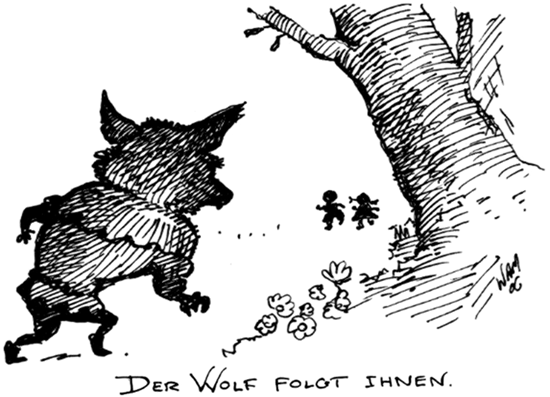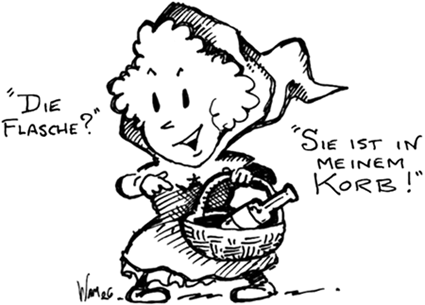1.5.1.5: Nominative pronouns
- Page ID
- 105114
Just like in English, personal pronouns in German are used to substitute nouns once they have already been mentioned, including people, animals, objects, or abstract ideas. There are nine basic personal pronouns in German. Well, sort of ...
er, sie, es
| Die Mutter geht heute auf den Markt. | The mother is going to the market today. |
| Sie geht heute auf den Markt. | She is going to the market today. |
| Das Mädchen kommt mit. | The little girl goes along. |
| Es kommt mit. | It goes along. (Mädchen is a neutral noun in German because of the 'chen' diminutive ending) |
| Der Wolf folgt ihnen. | The wolf follows them. |
| Er folgt ihnen. | He follows them. |

Another sie
| Die Mutter und Rotkäppchen kaufen eine Flasche Wein und frische Äpfel. | The mother and Little Red Riding Hood buy a bottle of wine and some fresh apples. |
| Sie kaufen eine Flasche Wein und frische Äpfel. | They buy a bottle of wine and some fresh apples. |
sie is used for both she and they, and you will need to figure out from the context who is actually shopping at the market. In this example the sie refers to both Little Red Riding Hood and her mom.
ich, du
| Rotkäppchen | Mama, ich möchte Wein trinken! | Mama, I want to drink some wine. |
| Rotkäppchens Mutter | Wie bitte??? Du darfst erst Wein trinken, wenn du 16 Jahre alt bist! | Yeah, right. You will be allowed to drink wine only when you are 18 years old! |
| Rotkäppchen | Aber, Mama, das Gesetz betrifft Märchenfiguren doch nicht, oder? | But mama, the law doesn't apply to fairy tale characters, does it? |
wir, ihr
| Rotkäppchen | Mama, darf ich mit Gretel ins Kino? Wir wollen den neuen Disneyfilm sehen! | Mama, can I go to the movies with Gretel? We want to see the new Disney film! |
| Rotkäppchens Mutter | Ihr dürft erst dann gehen, wenn ihr eure Aufsätze geschrieben habt. | You guys can go only when you have finished writing your essays. |
| Rotkäppchen | Unsere Aufsätze haben wir aber schon gestern geschrieben. Wir mussten "Rotkäppchen" aus der Perspektive des Wolfes neuschreiben. | But we already wrote our essays yesterday. We had to re-write "Little Red Riding Hood" from the perspective of the wolf! |
When es is not es
One big difference between German and English is the use of the pronoun es. In English, "it" is used whenever nouns do not have a biological gender. Therefore, any object or abstract noun will be considered "it." (Where is the castle? It is ...)
In German, however, every noun has a grammatical gender (der, die, das). When you substitute a noun with a personal pronoun, you need to pay attention to the noun's grammatical gender, which sometimes produces results that may sound strange to you.
| Großmutter | Rotkäppchen, hast du den Wolf gesehen? | Little Red Riding Hood, did you see the wolf? |
| Rotkäppchen | Ja, er war wieder am Rande des Waldes. Solch ein Versager! | Yes, it was at the edge of the forest again. What a loser! |
| Großmutter | Und wo ist die Flasche Wein? | And where is the bottle of wine? |
| Rotkäppchen | Sie ist in meinem Korb. | It is in my basket. |

Since wolf is a masculine noun, the masculine pronoun er substitutes it in the little girl's response. Next, the grandmother asks about the bottle of wine, feminine in German (die Flasche). Hence Little Red Riding Hood's response using sie. As a native speaker of English, you may want to choose the pronoun es (it) for any inanimate object (e.g., a bottle of wine), of course. Resist that urge, and don't worry: it takes a while to get used to German pronouns.
Terms of address: Du, Ihr and Sie
In German, there are three ways to address people you talk to:
Du is the informal equivalent of single "you." Du is reserved for friends, young people, children and pets.
Ihr is also informal, also means "you" but refers to more than one person. It is also used for friends, peers, people your own age, children and pets ... (think y'all)
Sie is the formal "you" and can be used when talking to one or more individuals. This is the appropriate expression to use when you meet other adults for the first time if you don't know them. Sie is a sign of respect, and is fairly common even among long-term acquaintances and work colleagues if they don't consider each other to be close friends.
Sie is the appropriate expression when you ask for help from sales persons, office clerks, your professors, strangers and people who are older than you.
| Großmutter | Rotkäppchen, kannst du bitte den Tisch decken? | Little Red Riding Hood, can you please set the table? |
| Rotkäppchen | Natürlich. Herr Jäger, wo möchten Sie sitzen? | Of course. Mr. Hunter, where would you like to sit? |
| Jäger | Gegenüber der Tür, wenn möglich. | Across from the door, if possible. |
| Großmutter | Rotkäppchen, du und deine Mutti, ihr sollt mich öfters besuchen! | Little Red Riding Hood, you and your mom, you guys should visit me more often! |
| Rotkäppchen | Aber Großmutter, unsere Geschichte würde langweilig werden! | But grandmother, our story would become boring! |
| Großmutter | Aha, da hast du Recht! | Oh, yeah, you're right! |
Nominative pronouns
This table reviews the different pronouns in the nominative case and what they mean.
| singular | plural | |
| 1st person | ich (I) | wir (we) |
| 2nd person | du (you) | ihr (y'all) |
| 3rd person masculine | er (he) | |
| 3rd person feminine | sie (she) | sie (they) |
| 3rd person neuter | es (it) | |
| formal | Sie (you) | |


